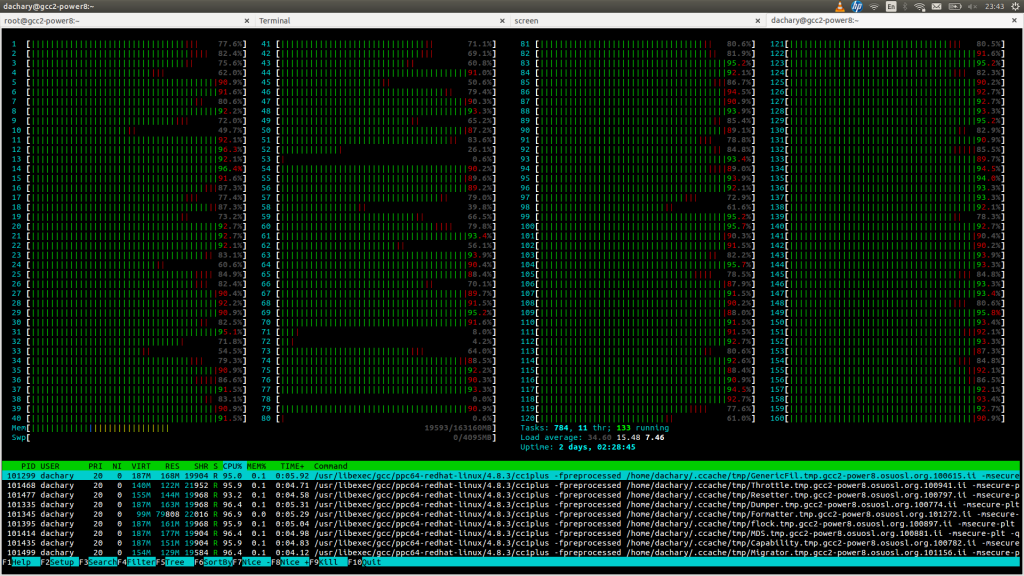The gitlab-mirrors scripts are installed to setup a a read-only Ceph mirror, updated hourly. It is used for permalinks such as src/osd/ClassHandler.cc#L170.
Continue reading “Ceph read-only mirror on gitlab”
HOWTO debug a teuthology task
To debug a modification to a ceph-qa-suite task ( for instance repair_test.py), a teuthology target is locked with:
$ ./virtualenv/bin/teuthology-lock --lock-many 1 --owner loic@dachary.org $ ./virtualenv/bin/teuthology-lock --list-targets --owner loic@dachary.org > targets.yaml
and used to run the test with:
./virtualenv/bin/teuthology \ --suite-path $HOME/software/ceph/ceph-qa-suite \ --owner loic@dachary.org \ $HOME/software/ceph/ceph-qa-suite/suites/rados/basic/tasks/repair_test.yaml \ roles.yaml
where roles.yaml sets all roles to one target:
roles: - [mon.0, osd.0, osd.1, osd.2, osd.3, osd.4, client.0]
Each run requires the installation and deinstallation of all Ceph packages and takes minutes. The installation part of repair_test.yaml can be commented out and the packages installed manually.
$ cat repair.yaml ... tasks: #- install: - ceph: - repair_test:
Gitlab workbench
Gitlab is installed on http://workbench.dachary.org using docker images. redis is installed first, as an independant container:
docker pull sameersbn/redis:latest docker run --name=redis -d sameersbn/redis:latest
then MySQL
docker pull sameersbn/mysql:latest docker run --name=mysql -d \ -e 'DB_NAME=gitlabhq_production' \ -e 'DB_USER=gitlab' \ -e 'DB_PASS=XXXXXXXXXXXX' \ -v /opt/mysql/data:/var/lib/mysql \ sameersbn/mysql:latest
and finally gitlab
docker pull sameersbn/gitlab:latest docker run --name='gitlab' -it -d \ --link mysql:mysql --link redis:redisio \ -e 'GITLAB_EMAIL=gitlab@workbench.dachary.org' \ -e 'SMTP_ENABLED=true' \ -e 'SMTP_DOMAIN=workbench.dachary.org' \ -e 'SMTP_USER=' \ -e 'SMTP_HOST=172.17.42.1' \ -e 'SMTP_PORT=25' \ -e 'SMTP_STARTTLS=false' \ -e 'SMTP_OPENSSL_VERIFY_MODE=none' \ -e 'SMTP_AUTHENTICATION=:plain' \ -e 'GITLAB_SIGNUP=true' \ -e 'GITLAB_PORT=80' \ -e 'GITLAB_HOST=workbench.dachary.org' \ -e 'OAUTH_ALLOW_SSO=true' \ -e 'OAUTH_BLOCK_AUTO_CREATED_USERS=false' \ -e 'OAUTH_GITHUB_API_KEY=github Client ID' \ -e 'OAUTH_GITHUB_APP_SECRET=github Client Secret' \ -e 'GITLAB_SSH_PORT=22' \ -p 22:22 -p 80:80 \ -v /var/run/docker.sock:/run/docker.sock \ -v /opt/gitlab/data:/home/git/data \ -v $(which docker):/bin/docker \ sameersbn/gitlab
The ssh server of the server will need to bind another port by editing /etc/ssh/sshd_config, changing the Port value and restarting the server with stop ssh ; start ssh.
The OmniAuth single sign on is configured following gitlab instructions, except for editing the config.yml file: the OAUTH_GITHUB_* are set instead, using information found in the applications settings github page.
It uses the automagic dockerlinks to connect it to the MySQL and redis servers (–link mysql:mysql –link redis:redisio). The SMTP server is configured using variables from the documentation to point to the server running on the host (172.17.42.1 is the IP of the docker0 bridge on which all containers are connected and in the same IP range as the dynamic IP they are given). A postfix server is installed on the host:
$ sudo apt-get install postfix ... chose internet server ...
and it is configured to accept to relay mails from any docker contain in the 172.0.0.0/8 IP range:
$ cat /etc/postfix/main.cf ... myhostname = workbench.dachary.org alias_maps = hash:/etc/aliases alias_database = hash:/etc/aliases myorigin = /etc/mailname mydestination = workbench.dachary.org, localhost, localhost.localdomain, localhost relayhost = mynetworks = 172.0.0.0/8 127.0.0.0/8 [::ffff:127.0.0.0]/104 [::1]/128 ...
A working SMTP server is required to allow sign up as required with GITLAB_SIGNUP=true. The gitlab persistent data is in /opt/mysql/data (bind mounted with -v /opt/mysql/data:/var/lib/mysql) for the MySQL database and /opt/gitlab/data (bind mounted with -v /opt/gitlab/data:/home/git/data) for repositories, gitlab assets etc. When the host reboots, the containers can be restarted as above, they only contains non persistent information.
Teuthology docker targets hack (2/5)
The teuthology container hack is improved to snapshot the container after Ceph and its dependencies have been installed. It helps quickly testing ceph-qa-suite tasks. A job doing nothing but install the Firefly version of Ceph takes 14 seconds after the initial installation (which can take between 5 to 15 minutes depending on how fast is the machine and how much bandwidth is available).
...
2014-11-17 01:21:00,067.067 INFO:teuthology.worker:Reserved job 42
2014-11-17 01:21:00,067.067 INFO:teuthology.worker:Config is:
machine_type: container
name: foo
os_type: ubuntu
os_version: '14.04'
overrides:
install:
ceph: {branch: firefly}
owner: loic@dachary.org
priority: 1000
roles:
- [mon.a, osd.0, osd.1, client.0]
tasks:
- {install: null}
tube: container
verbose: false
Fetching from upstream into /home/loic/src/ceph-qa-suite_master
...
completed on container001: sudo lsb_release '-is': Ubuntu
reusing existing image ceph-base-ubuntu-14.04-firefly
running 'docker' 'stop' 'container001'
completed ('docker', 'stop', u'container001') on container001: container001
...
2014-11-17 01:21:31,677.677 INFO:teuthology.run:Summary data:
{duration: 14, flavor: basic, success: true}
2014-11-17 01:21:31,677.677 INFO:teuthology.run:pass
Running make check on Ceph pull requests
Each Ceph contribution is expected to successfully run make check and pass all the unit tests it contains. The developer runs make check locally before submitting his changes but the result may be influenced by the development environment. A draft bot is proposed to watch the list of pull requests on a github repository and run a script based on github3.py each time a new patch is uploaded.
cephbot.py --user loic-bot --password XXXXX \ --owner ceph --repository ceph \ --script $HOME/makecheck/check.sh
If the script fails, it adds a comment with the output of the run to the pull request. Otherwise it reports success in the same way.
Continue reading “Running make check on Ceph pull requests”
make -j150 ceph
A power8 machine was recently donated to the GCC compile farm and /proc/cpuinfo shows 160 processors. Compiling Ceph from sources with make -j150 makes for a nice htop display.
The result of the compilation passes most of the unit tests, with a few minor exceptions such as bloom filter.


